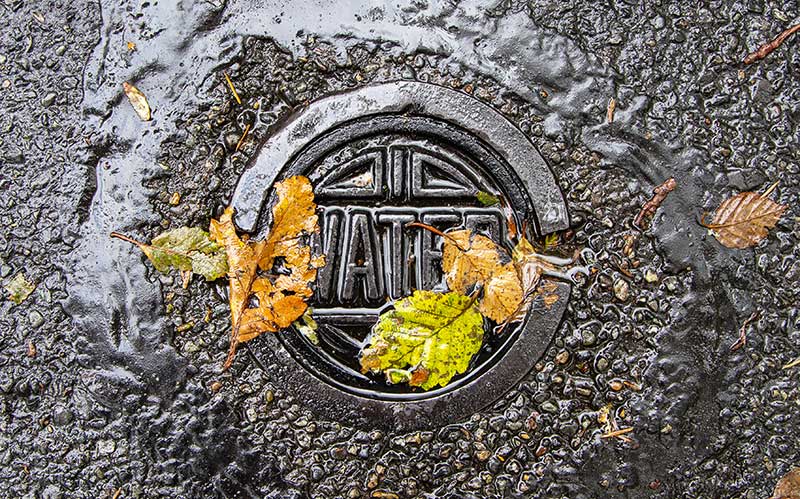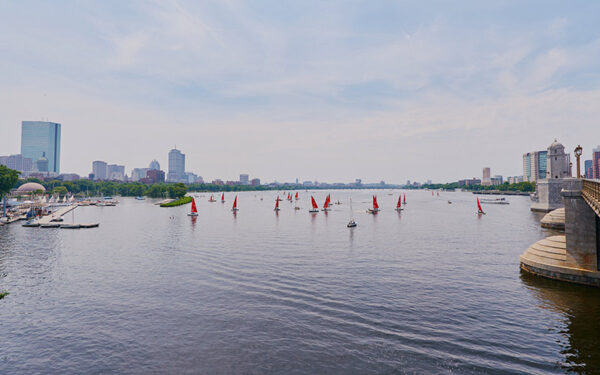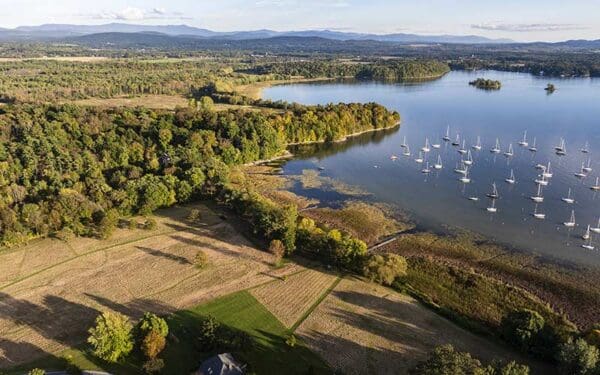
The biggest threat to clean water today? Stormwater polluted from our acres of parking lots, office parks, and other hardened surfaces. Maine is working to clean up the biggest source of polluted runoff: our cities and towns. Photo: IStock
A decade ago, South Portland’s Long Creek teetered on the edge of crisis, so polluted that it could barely sustain wildlife. Surrounded by big box stores, parking lots, and office buildings of the ever-expanding Maine Mall area, the meandering creek had been cowed by stormwater pollution. When rain fell or snow melted, it would rush over the area’s acres of hardened surfaces, picking up debris, pesticides, metals, oil, and other pollutants, churning them into a contaminated soup that drained into the creek.
Today, Long Creek is on the mend, thanks to a pioneering lawsuit by CLF that expanded the reach of the Clean Water Act. Our victory forced EPA and the Maine Department of Environmental Protection (DEP) to require unregulated businesses to treat and control the polluted stormwater flowing from their properties into the ailing waterway. But, while we celebrate that success, our creeks, stream, rivers, lakes, and coastal waters remain at risk. Polluted runoff poses the biggest threat to clean water today, harming the health of our communities and people and hurting our economy when it closes our beaches or requires us to treat our drinking water at home.
To solve the stormwater pollution problem, we must address its largest source: the storm sewers of our cities and towns. And that’s what the DEP is now working to do. A proposed new permit program will not only limit and control the volume of pollution flowing from the storm sewers in our communities but also require cities and towns to devise plans to prevent that pollution in the first place.
New Program Will Require Cities and Towns to Manage and Prevent Polluted Runoff
The State of Maine was supposed to update the permit program that regulates water pollution from a city or town every almost a decade ago. However, in another example of the LePage administration’s attempts to sabotage environmental regulation and hobble the DEP, that process was delayed. Now under the Mills administration, the state agency has set a goal to finalize the new regulations by the end of this year.
The new general discharge permit will apply to cities and towns with municipal separate sewer systems, or MS4s. These systems handle only stormwater runoff, as opposed to the sewer system and treatment plants that carry wastewater and raw sewage from our homes and businesses. Here in Maine, the new regulations will apply to 30 communities, from Kittery to Old Town.
Specifically, once finalized, the general discharge permit will require each city or town to develop a Stormwater Management Plan. The plan must establish basic measures around:
- educating and reaching out to residents and businesses about the conditions that lead to stormwater pollution;
- involving residents in developing and implementing solutions on their properties;
- detecting and eliminating illicit discharges;
- controlling stormwater runoff on construction sites;
- managing stormwater in new developments and redevelopments; and
- creating best management practices for municipal operations.
In addition to these measures, cities and towns also will need to develop a Stormwater Pollution Prevention Plan to stop polluted runoff before it happens. Stormwater pollution is not inevitable, even in heavily developed areas. The work to address stormwater pollution in South Portland serves as an example for all Maine communities as CLF, the DEP, businesses, and city officials ultimately collaborated to develop the solutions, such as permeable pavement, that led to Long Creek’s recovery.
With Climate Change Making Stormwater Pollution Worse, We Need Action Now
CLF has pushed for years for stormwater to be regulated on a city- and townwide basis, and we look forward to the release of the final draft of the proposed permit later this month. Getting to this point hasn’t been easy, particularly in a time of tight municipal budgets. But with climate change already causing more intense storm events, we don’t have any more time to lose to deal with our polluted runoff problem. A permit program that tightens regulations to prevent stormwater pollution will help move us forward to achieving healthy, clean waters for all Mainers – and that’s good for our health, our environment, and our economy.
Maine DEP will accept public comments on the final draft for 30 days after it is published. We’ll need your support to keep this new permit program as strong as possible. Stay tuned for ways you can make your voice heard.



